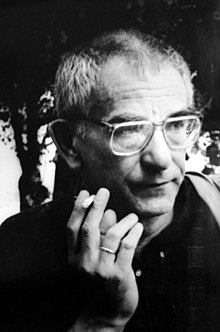Krzysztof Kieślowski
| Krzysztof Kieślowski | |
|---|---|

Krzysztof Kieślowski, 1994
|
|
| Born |
27 June 1941 Warsaw, Poland |
| Died | 13 March 1996 (aged 54) Warsaw, Poland |
| Alma mater | National Film School in Łódź |
| Spouse(s) | Maria Cautillo (1967–1996; his death) |
Krzysztof Kieślowski (Polish pronunciation: [ˈkʂɨʂtɔf kʲɛɕˈlɔfskʲi]; 27 June 1941 – 13 March 1996) was an influential Polish art-house film director and screenwriter known internationally for Dekalog (1989), The Double Life of Veronique (1991), and the Three Colors trilogy (1993–1994). Kieślowski received numerous awards during his career, including the Cannes Film Festival Jury Prize (1988), FIPRESCI Prize (1988, 1991), and Prize of the Ecumenical Jury (1991); the Venice Film Festival FIPRESCI Prize (1989), Golden Lion (1993), and OCIC Award (1993); and the Berlin International Film Festival Silver Bear (1994). In 1995 he received Academy Award nominations for Best Director and Best Writing. In 2002 Kieślowski was listed at number two on the British Film Institute's Sight & Sound Top Ten Directors list of modern times.
Kieślowski was born in Warsaw, the son of Barbara (née Szonert) and Roman Kieślowski. He grew up in several small towns, moving wherever his engineer father, a tuberculosis patient, could find treatment. He was raised Roman Catholic and retained what he called a "personal and private" relationship with God. At sixteen, he attended a firefighters' training school, but dropped out after three months. Without any career goals, he then entered the College for Theatre Technicians in Warsaw in 1957 because it was run by a relative. He wanted to become a theatre director, but lacked the required bachelor's degree for the theatre department, so he chose to study film as an intermediate step.
...
Wikipedia
